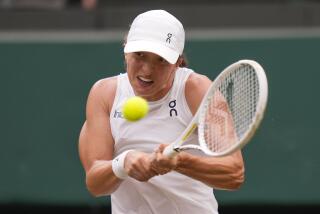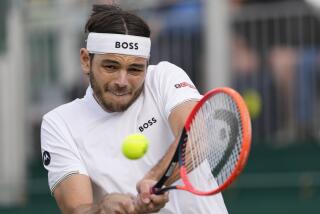Suspicious matches on list
- Share via
LONDON -- The four governing bodies of professional tennis met here Friday to galvanize plans to counter alleged match-fixing, and reaffirmed their belief in the integrity of the sport, even as a list circulated of 140 suspicious matches dating to 2002.
Most of the matches on the list, a copy of which was obtained by The Times, involve lower-ranked players and were singled out because of unusual betting patterns. The allegations range from tanking to set-score fixing to predetermined retirement.
Allegations of matches being thrown has clouded the sport since early August when No. 4 Nikolay Davydenko retired from a match against No. 87 Martin Vassallo Arguello, prompting an online betting service to take the unusual step of voiding all wagers. Since then, at least five players have contended there is a problem with match-fixing.
The list has sites, players, scores and comments such as, “At it again,” and, “150k [150,000 pounds] had been traded on [name] overnight, the next-highest traded matches were 80k and 27k,” and, “Odds lengthen after he takes the first set. The ATP call[s] [British bookmaker] Sporting Odds to see if any strange betting patterns.”
Representatives of the ATP, which governs men’s tennis, acknowledged the list but said it had not been part of Friday’s meeting, which included the WTA, which governs women’s tennis; the International Tennis Federation; and the Grand Slam Committee. The groups discussed consolidating regulations.
Separately, WTA chief executive Larry Scott told The Times on Friday that he knew of two matches on the women’s tour this year that were marked by suspicious betting patterns and that one is considered closed. The other is pending.
At least one of them is among the 140 listed. Scott said the two matches he cites helped convince him that serious steps are needed to protect the game’s integrity.
To that end, Scott attended a meeting at Wimbledon and broached the subject with the heads of the Grand Slams, the four most prestigious events in tennis, and the president of the ITF, Francesco Ricci Bitti. Scott said he suggested the time had come for the sport’s governing bodies to pool resources.
“We need to look at this like the anti-doping program,” Scott said in a telephone interview.
Asked whether tennis had a gambling problem, he said, “No, I don’t think so. Maybe I should only speak for women’s tennis. I’m very confident women’s tennis does not have a serous problem.”
The Wimbledon meeting came before a series of developments that rocked the sport, starting with an investigation of the Aug. 2 Davydenko-Arguello match.
Davydenko retired in the third set, citing injury. But the British online bookmaker, Betfair, voiding all bets after seeing unusually heavy wagering in favor of Arguello, who had lost the first set.
Davydenko told Reuters on Thursday that he met with ATP representatives last month and expected the investigation into his match to take another month.
That match, however, set off a series of revelations, hitting a fever pitch this week when No. 19 Andy Murray spoke out in a BBC radio interview and said match-fixing was common knowledge. He has since said his comments were taken out of context.
The meeting at Wimbledon and another at the U.S. Open led to Friday’s gathering, which featured representatives of the British horse racing industry, which survived a similar crisis, and Britain’s new Gambling Commission.
One spokesman deemed the meeting a routine process, while another called it an “initial” step.
Afterward, ITF executive director Bill Babcock declined comment but referred to a statement released by all four entities:
“The ITF, Sony Ericsson WTA Tour, ATP and the Grand Slam Committee have full confidence in the integrity of our sport. Today’s meeting reaffirmed tennis’ unified approach to protecting that integrity. While we do not believe that our sport has a corruption problem we do recognize that a threat . . . exists.”
Scott, a continent away, called it the first of many meetings and that “a lot of work” would need to be done. “The good news is that we’re not the pathfinders in this area,” he said. “Other sports have had to deal with this a lot longer -- horse racing, cricket. We can learn a lot from them.”
The two matches cited by Scott came at smaller events. The first one, now considered closed, was at a tournament in the first half of the year and involved betting amounts “of six figures.” He declined to name the players.
The other case, still open, occurred Sept. 21. Unusual betting patterns developed in a quarterfinal match at Kolkata, India, between Mariya Koryttseva of Ukraine and Tatiana Poutchek of Belarus. The lower-ranked Koryttseva, won, 6-4, 6-2. One report had more than $1.5 million wagered on the outcome. News reports indicated the match was a closed case, but Scott said the tour was still looking into it.
“Our people on site said there was no question about the effort,” he said of the players. “It takes a while.”
--
Culpepper reported from London. Dillman reported from Los Angeles.
More to Read
Go beyond the scoreboard
Get the latest on L.A.'s teams in the daily Sports Report newsletter.
You may occasionally receive promotional content from the Los Angeles Times.











